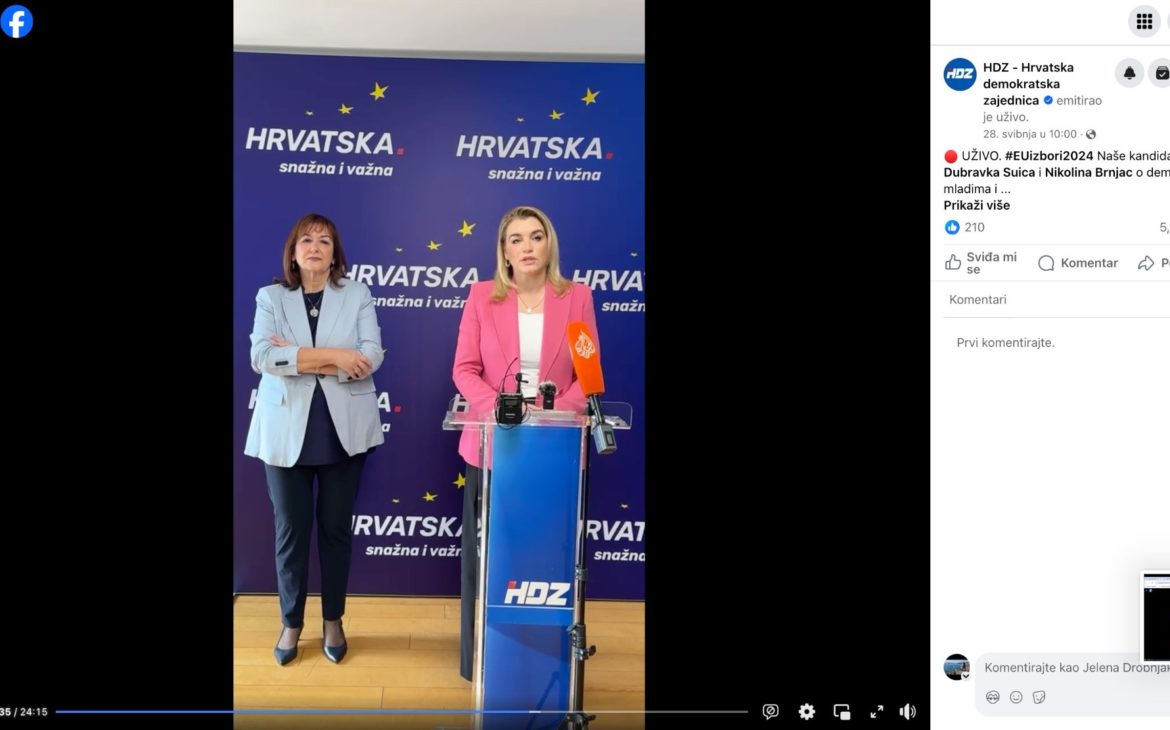Part of the statement about record amounts and the wide use of European funds is accurate but saying that “everything” is built with European funds is not true.
On the official Facebook page of the HDZ, a press conference of HDZ candidates for the European elections on demography, youth, and the green transition was broadcast on May 26, where Dubravka Šuica and Nikolina Brnjac spoke.
Nikolina Brnjac at the press conference stated: “Croatia has had record amounts so far, precisely from European funds. So far, over twenty-five billion euros. Everything you see, schools, kindergartens, museums, hospitals, roads, is all built with European funds.” (Source: Facebook, 15:53 minutes).
We investigated the statement and it is INCORRECT.
Part of the statement about record amounts and the wide use of European funds is accurate, but saying that “everything” is built with European funds is not true. Most public investments indeed come from these funds, but not everything is exclusively financed this way. Over 70% of all public investments in Croatia are financed from European funds (projects in education, health, transport, and other sectors).
At this moment, together with the funds from the National Recovery and Resilience Plan, Croatia has a total surplus of 14.9 billion euros, which is the difference between funds received by Croatia and Croatia’s participation in the EU budget.
Therefore, Croatia has so far received 14.9 billion euros, and it is true that almost all public investments are financed with EU funds, some local governments have even banned investments not covered by these funds, but so far, Croatia is in surplus by “only” 14.9 billion, meaning the statement is incorrect. Croatia has around 25 billion euros available from the latest envelope, but whether it will spend them depends on numerous factors.
Croatia utilized all funds from the 2014–2020 programming period, and Minister Šime Erlić announced the final Declaration of Expenditures, worth more than 480 million euros, which certifies the total available amount of funds.
“Tomorrow, Croatia will send the European Commission the final Declaration of Expenditures, justifying all allocated cohesion fund resources from the previous financial perspective of 2014–2020. We have utilized and certified all available funds, and I must say I am extremely proud of all the bodies in the system and all the employees who have done a very large and demanding job. This is our first envelope of EU funds, and it was natural that we faced numerous challenges. However, through good management, adjustments, and capacity building, we have shown readiness and successfully realized all funds. In the past few years, we have made significant progress. We were at the bottom in terms of fund disbursement in the EU-27, and today we are in 7th place. Increasing the efficiency of fund spending has had a direct positive impact on the realization of numerous projects across Croatia, as well as on accelerating development and high GDP growth rates. Croatia is often highlighted as an example of the success of European cohesion policy, and I am confident that we will continue this in the time ahead,” said Minister Erlić.


